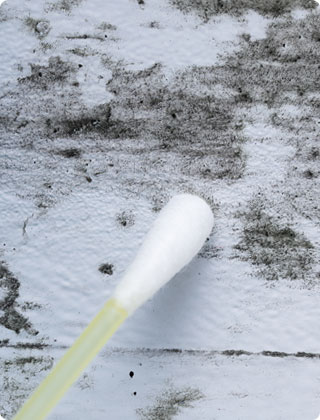
The Value of Surface Sampling Strategies in Mold Testing
Surface sampling strategies are fundamental to successful mold inspection and mold testing. 'Surface sampling' means systematically gathering dust, debris, or biofilm from surfaces within a building for lab analysis. This step is critical for identifying mold, figuring out the extent of contamination, and ultimately protecting people's health and property from mold damage.
By using the right surface sampling strategies, professionals can uncover hidden mold, verify the success of remediation efforts, and improve indoor air quality. The goal of this article is to explain actionable methods and best practices for surface sampling to make sure your mold testing is accurate and helps ensure remediation works the first time.
What is Surface Sampling? Understanding Mold Surface Sampling and Collection
Surface sampling is the collection of residues, dust, or visible mold from building surfaces to confirm contamination. Unlike air sampling, which checks what's floating around, mold surface sampling focuses on specific spots where contamination is suspected or visible. This type of mold testing includes collecting samples from places showing mold growth, moisture, or stains.
Common situations for surface sampling include:
- Confirming visible mold's type.
- Making sure cleaning worked after remediation.
- Checking if mold or allergens are affecting indoor air quality.
Using targeted techniques, surface sampling helps ensure precise mold sample collection and supports thorough mold investigation, especially where mold is hard to see or reach.
Why Surface Sampling Matters in Mold Inspection
Surface sampling is essential in any professional mold inspection. While air testing reveals what's circulating in the environment, mold surface sampling directly shows how much mold is present on specific building materials and where it's coming from. This direct testing gives a more accurate picture of the contamination problem.
A major advantage is specific mold identification. Certain molds are more dangerous or need special remediation methods. Surface sampling results provide a baseline for planning and post-cleanup (clearance) testing - proving if the job was done right.
Overview of Surface Sampling Strategies
Surface sampling strategies involve systematic planning on where and how to collect samples for mold testing. Getting this right ensures all contaminated areas are found and all samples correctly represent the true situation.
Main factors that shape these strategies:
- Type of surface or material: Porous surfaces like drywall may need deeper testing, while non-porous surfaces like tiles can be sampled at the top layer.
- Visibility & accessibility: Is there visible mold, or just signs like moisture stains? Hidden spots or tight spaces may need special tools.
- Environmental conditions: Places with leaks, high humidity, or water damage are higher mold risks.
- History of problems: Areas hit by repeated water damage or known for past mold issues require extra attention.
By adapting your surface sampling strategies - whether for an initial check, detailed inspection, or post-remediation clearance - you improve detection and decision-making outcomes.
Methods of Mold Surface Sampling
There are four main mold surface sampling techniques, and picking the best one improves your results:
- Swab Sampling: Best for small, tricky spots like HVAC fins or behind trim. Sterile cotton swabs are rubbed over the area to collect material. Accurate but only covers a limited space.
- Tape Lift Sampling: Uses clear adhesive tape to grab mold from flat, visible surfaces (like painted walls or tiles), which is then checked under a microscope. It's quick but won't pick up mold inside porous surfaces.
- Bulk Sampling: A chunk of material (drywall, carpet, insulation) is cut out and sent to the lab. Detailed, especially for hidden or deep mold, but is at least partially destructive.
- Wipe Sampling: Moistened wipes are used on a defined area, sealing the sample for analysis. Good for broad coverage on smooth surfaces, like floors or ductwork.
O2 Mold Testing chooses the best sampling technique based on whether the mold is visible, the surface material, and the extent of suspected growth. Using the right method ensures results are valid and actionable.
When to use each method:
- Use swabs for irregular or hard-to-reach places.
- Choose tape for obvious, visible mold.
- Go for bulk when you need to analyze inside material during demolition.
- Use wipes for screening larger, flat surfaces or equipment.
Mold Sample Collection: Step-by-Step Guide
Proper mold sample collection is critical for trustworthy results during surface sampling. Follow this clear process:
Identify & Prioritize Sites
- Look for visual signs: stains, water spots, mold patches.
- Use a moisture meter in suspicious areas.
Gather Materials
- Prepare your sampling tools (swabs, tape, wipes, sample containers).
- Get gloves and a marker for labeling.
- Have a logbook or data sheets ready.
Collection Technique
- Wear fresh gloves for each sample.
- Always use a new, sterile tool per sample.
- Follow precise area guidelines (like 1x1 inch spots).
- Seal each sample in a labeled container immediately.
Prevent Cross-Contamination
- Change gloves and tools at every new site.
- Keep samples separated during storage and transport.
Thorough Documentation
- Record everything: location, time, method, temperature/humidity, your initials.
- Update your logbook for each sample.
Proper Transport
- Store at room temperature (unless otherwise directed).
- Deliver samples to the lab quickly - this ensures mold identification is based on real conditions, not contamination or degradation.
How Laboratories Analyze Mold Samples
After collection, samples go to a specialized lab for mold testing and identification. Key analysis methods include:
- Microscopy: Identifies mold spores and structures.
- Culturing: Grows mold from the sample to pinpoint the species.
- Molecular Analysis (PCR/DNA): Targets hidden or dangerous molds using their genetic code.
Reading Lab Reports
- Spore counts: Measure severity - high counts mean active or extensive mold growth.
- Dominant species: Identifies if the mold is typical or hazardous (e.g., black mold).
- Toxigenic species presence: Immediate action is required for dangerous molds.
Lab reports will show spore counts and identify the dominant and toxigenic mold species present. High counts indicate active growth. If the lab finds toxigenic molds, immediate remediation is usually recommended. Low levels of common, harmless molds may only need basic cleaning and monitoring. The expertise of O2 Mold Testing ensures accurate interpretation and an effective cleanup response for your building.
Best Practices for Surface Sampling
Surface sampling requires strict attention to detail and safety:
- Wear protection: Gloves, masks, and sometimes goggles or coveralls prevent exposure and cross-contamination.
- Record everything: Every sample's location, date, sampling method, and environmental conditions should be logged, along with photos if available.
- Clear labeling: Samples must be marked with all info (date, place, method) to avoid confusion in the lab.
- Chain of custody: Track who handled each sample - crucial for insurance, legal, and regulatory use.
- Correct storage/transport: Most samples stay at room temp and must reach the lab fast to prevent changes.
- Always retest after remediation: Confirm cleanup was complete by running clearance surface sampling.
These best practices are the backbone of dependable mold testing - don't skip steps if you want credible results.
Common Mistakes and How to Avoid Them
Even trained professionals can make mistakes that affect results:
- Overlooking critical areas: Don't skip under carpets, inside ducts, behind appliances, or above ceilings—these places often hide major mold problems.
- Improper tool use: Reusing tools or using contaminated equipment spreads mold and ruins test accuracy.
- Weak documentation: Skipping details or mixing up samples makes findings hard to use and can discredit your efforts.
- No post-remediation testing: Always check cleaned areas again to avoid recurring mold issues.
Technician checklist:
- Pre-plan where you'll test, including hidden and hard-to-reach spots.
- Always use clean, sterile tools for every single sample.
- Double-check labels and logs before sending samples.
- Don't skip follow-up testing—remediation isn't done until clearance is confirmed.
Careful planning and strict documentation prevent most errors, ensuring the entire mold testing process gets reliable, actionable results.
The Importance of Surface Sampling Strategies for Mold Testing
Strong surface sampling strategies are essential for reliable mold testing, accurate mold inspection, and full mold remediation. These methods identify the exact scope and type of contamination, shape the remediation plan, and confirm when a space is truly safe again.
Keep good surface sampling habits at every stage—regular inspection of risk areas, careful mold sample collection, and rigorous post-remediation checks. This routine protects your property from costly long-term damage and, most importantly, keeps the people inside safe from hidden mold hazards.
Remember, mold is often out of sight but never out of reach. By following best practices for surface sampling, from precise swab or tape lift sampling to complete documentation and chain of custody, you make sure the evidence guiding your cleanup is trustworthy and actionable. These approaches let property owners and professionals alike catch problems early, determine the right remediation technique, and avoid future recurrences.
For the best results in complex or stubborn cases, always partner with certified mold inspection and mold testing professionals like those at O2 Mold Testing. Our experts are trained in the full range of surface sampling strategies and adhere to the highest industry standards—so you can be sure your environment is healthy and mold-free.


